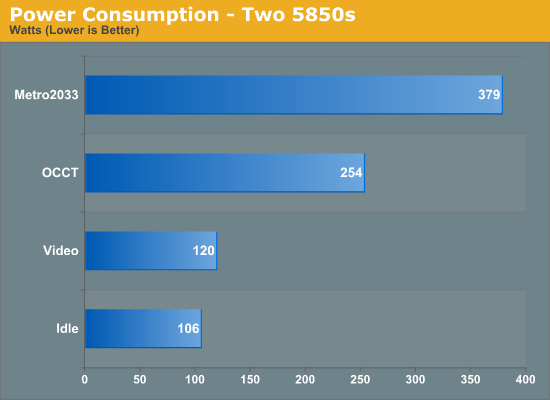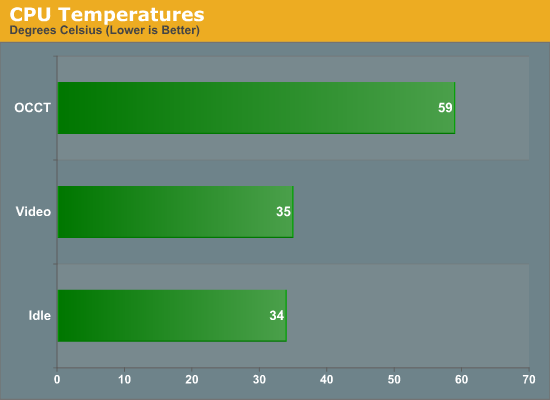Intel DX79SI Review: The Default X79?
by Ian Cutress on November 18, 2011 1:10 AM EST- Posted in
- Motherboards
- Intel
- X79
Test Setup
| Processor |
Intel Sandy Bridge-E i7-3960X 6 Cores, 12 Threads, 3.3 GHz (3.9 GHz Turbo) |
| Motherboards | Intel DX79SI 'Siler' |
| Cooling | Intel All-In-One Liquid Cooler, made by Asetek |
| Power Supply | Silverstone 1000W 80 PLUS Silver |
| Memory | G.Skill RipjawsZ DDR3-2133 9-11-9 28 4x4 GB Kit 1.65V |
| Memory Settings | XMP |
| Video Cards |
XFX HD 5850 1GB ECS GTX 580 1536MB |
| Video Drivers |
Catalyst 11.8 NVIDIA Drivers 285.62 |
| Hard Drive | Micron RealSSD C300 256GB |
| Optical Drive | LG GH22NS50 |
| Case | Open Test Bed - CoolerMaster Lab V1.0 |
| Operating System | Windows 7 64-bit |
| SATA Testing | Micron RealSSD C300 256GB |
| USB 2/3 Testing | Patriot 64GB SuperSonic USB 3.0 |
Comparison to Other Reviews
Where applicable, the results in this review are directly compared to the following chipsets and boards which we have reviewed previously.
Power Consumption
Power consumption was tested on the system as a whole with a wall meter connected to the power supply, while in a dual GPU configuration. This method allows us to compare the power management of the UEFI and the board to supply components with power under load, and includes typical PSU losses due to efficiency. These are the real world values that consumers may expect from a typical system (minus the monitor) using this motherboard.

CPU Temperatures
With most users’ running boards on purely default BIOS settings, we are running at default settings for the CPU temperature tests. This is, in our outward view, an indication of how well (or how adventurous) the vendor has their BIOS configured on automatic settings. With a certain number of vendors not making CPU voltage, turbo voltage or LLC options configurable to the end user, which would directly affect power consumption and CPU temperatures at various usage levels, we find the test appropriate for the majority of cases. This does conflict somewhat with some vendors' methodology of providing a list of 'suggested' settings for reviewers to use. But unless those settings being implemented automatically for the end user, all these settings do for us it attempt to skew the results, and thus provide an unbalanced 'out of the box' result list to the readers who will rely on those default settings to make a judgment.

As with the ASUS P9X79 Pro I've reviewed, using something very CPU stressful, even on the Intel Liquid Cooler, makes the CPU temperatures shoot up even outside of a case.










60 Comments
View All Comments
coldfiredragon - Friday, November 18, 2011 - link
Oh ya I have been using them exclusivly since arround 99, with their 440BX board for Pentium 3's. I love them, solid dependible I have never had to RMA one.The0ne - Friday, November 18, 2011 - link
I used them exclusively for work back them. By this I mean I tested and qualify the boards and CPU's for our products. and to deploy in the mfg environment. The key characteristic is, of course, reliability.Not sure why the person above doesn't know this :) Maybe this link can help,
http://knowyourmeme.com/memes/futurama-fry-not-sur...
vol7ron - Sunday, November 20, 2011 - link
I've never actually owned the Intel branded boards. I think the primary reason is that I like the potential to overclock and whenever there were articles of this, Intel either locked their settings, or their boards didn't overclock all that well (either through voltage regulation or thermal problems).Any comments regarding this?
Bozo - Saturday, November 19, 2011 - link
I have been using Intel motherboards since the mid 1990's at work. If you want stability and reliability, Intel is the way to go.mino - Sunday, November 20, 2011 - link
Most of the time ... Had a lot of 50 PC's with Intel mobo's go POOF within 2Q after getting our of warranty. ... THoug those were NetBurst times. KInda expected they will "Burst" :).On a serious note, business-class Intel Mobo's are one of the best as far as reliability goes.
Though, over the past 5 years since reliability actually became a marketing term in the mobo business, the gap as it was in the 90's and starting 2000's is no longer there.
acompsys - Wednesday, November 30, 2011 - link
True...http://www.youtube.com/watch?v=z0uXWmlMOgg
Googer - Sunday, November 20, 2011 - link
Intel has been in the motherboard business for about 17-18 years or so. I still have my old Intel Socket 370 FCPGA2 Motherboard from 10 years ago.Googer - Sunday, November 20, 2011 - link
A lot of OEMs use intel as their Board maker. Dell used (or still uses?) a Custom Intel board in their machines, Emachines used a rebadged off the shelf intel board in their cases too.mino - Monday, November 21, 2011 - link
OEM's not so much. Whiteboxers mostly, along with several "wanna-be's", Dell included in its early years.PrezWeezy - Sunday, November 20, 2011 - link
Intel has been making their own motherboards for a very long time. They aren't usually known for being the fastest boards around, but they are damn solid. Very very few failures comparitively, and they run forever. They also tend to be very expensive.